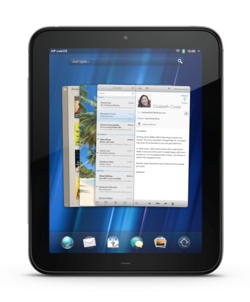After months of speculation about what, exactly, “Early Summer” means, HP has announced that their WebOS tablet will be out July 1st. With $499 for a 16 GB model and $599 for a 32 GB model, prices are right up there with Apple’s iPad2, the market leader/trend-setter.
The question is – does anyone still care? I’m a WebOS user and honestly think the OS is better and more robust than Android, and (until iOS 5) has features Apple’s products just don’t (tight cloud integration, slick notifications, realtime multitasking). However, in the time it’s taken HP to confirm the Touchpad’s details, Google and Apple have really started addressing those lacks. Plus, WebOS has a very strong lack: developers.
Despite a passionate (yet dwindling) user base, and an embrace of homebrew/hackers like possibly no other platform, HP has simply not attracted the developers needed to really maintain (or dare I say, develop) any kind of traction. Even if we discount the signal-to-noise ratio of soundboards and bodily function apps to real, useful ones, we’re still talking being behind by the thousands. Even late-comer Microsoft has more Windows Phone 7 apps than there are official, non-Homebrew WebOS apps (because Tech love WebOS-Internals, but the average day to day user isn’t messing with that. Making matters worse, HP is now closing down their XML store feeds, meaning without a device in and you’ll have no idea what’s out there. Baffling decision akin to shooting one’s self in the foot.
HP’s one advantage to other vendors, their scale and retailer relationships, may be vast, but the lack of des, apps, and indeed an existing user base, may doom what should really be an awesome product to being an interesting footnote.


[…] deeper than any other smartphone/tablet combination, with the possible exception of HP’s new Touchpad for webOS. The Playbook seems to be a device intended for both consumers and enterprise users, and […]